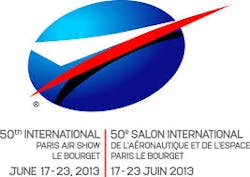Parker Aerospace and Oxsensis to develop accurate, stable fiber optic pressure sensor
PARIS, 19 June 2013. Parker Aerospace, a business segment of Parker Hannifin Corp. (NYSE:PH), and Oxsensis Ltd. will jointly develop a highly accurate, highly stable pressure sensor for aerospace applications based on fiber-optic technologies.
Parker Aerospace and Oxsensis Ltd. signed an agreement at the 2013 Paris Air Show to apply Oxsensis technology to a Parker aero instrumentation system. The new technology and products will be developed by the two companies, building on Parker’s system integration aero-qualification and engineering skills and on Oxsensis’ optical sensor capabilities, according to officials.
This alliance follows successful progress on a technology-inspired collaborative research and development project supported by the United Kingdom’s Technology Strategy Board. The Technology Strategy Board’s Collaborative Research and Development Project started in Nov. 2011, when Parker Aerospace, Oxsensis, and Nottingham Trent University formed a consortium. To date, robust progress on this project has extended Parker and Oxsensis’ agreement to include product development and exploration.
Oxsensis Ltd. brings a key new technology and expertise in developing stable pressure sensors for harsh environments and the electronics and opto-electronics for interfacing with them. Combined with Parker Aerospace's experience in developing reliable aircraft systems and equipment, this new technology will make Parker's future system designs more competitive, offering a highly integrated, fiber-optic-based system for the aerospace market.
“The pressure sensor to be designed will provide more precision than existing commercially available electrical sensors, while also being suitable for use at low temperatures and under high-vibration conditions,” comments Parker Aerospace Principal Engineer for Gauging and Sensors Dr. Lewis Boyd. “The use of fiber optics is also expected to deliver a sensor that is immune to electromagnetic interference (EMI) and completely free of any metallic or electrically conductive materials.”

Courtney E. Howard | Chief Editor, Intelligent Aerospace
Courtney enjoys writing about all things high-tech in PennWell’s burgeoning Aerospace and Defense Group, which encompasses Intelligent Aerospace and Military & Aerospace Electronics. She’s also a self-proclaimed social-media maven, mil-aero nerd, and avid avionics and space geek. Connect with Courtney at [email protected], @coho on Twitter, on LinkedIn, and on Google+.

